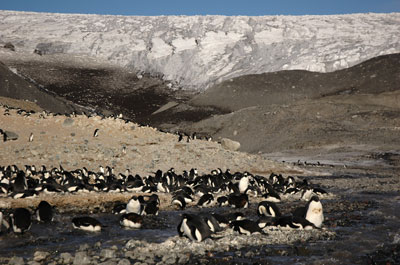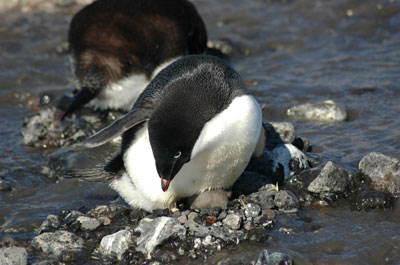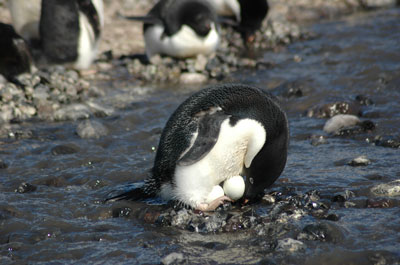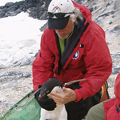Melting Glacial Torrents
CAPE BIRD, ANTARCTICA– We paid a visit to Cape Bird to begin a pilot project to assess the hemoglobin and hematocrit (red blood cell count) levels of penguins. In the past we’ve found that there are marked differences in the diving/foraging behavior of penguins, and often this translates into their abilities to provision their chicks with food. Our first step in trying to figure out what factors are behind this is to see how well their blood can store oxygen. More on this later, though.
Recently we had quite a warm spell, about two weeks of temperatures around 3°C, actually the longest and warmest that I’ve experienced in these parts (Ross Island). That’s added to the already slightly warm summer that has been evident. When I paid this visit to Cape Bird, which I’ve done a few times almost every year for the past 6-7 years, I found some surprises. Usually the glacier there is spouting run-off streams but nothing like this year, when it was literally gushing water in innumerable places across its entire breadth, with impressive rivers in a few. My colleagues and I have been investigating the factors, related to climate, that cause penguins and their colonies to come and go, but this is one factor I hadn’t had in mind, until now.

A stream of water tearing away the terrain on which this group of penguins had chosen to nest. A hummock, which penguins seek out for nesting, usually protects them from this sort of thing.
On the one hand, over the long term, this slowly retreating glacier has provided a nesting place for Adélie penguins as well as bountiful nest stones in its moraines. As you may or may not know (Hey! Read about it at our Web site: www.penguinscience.com), very little of the Antarctic coastline is sufficiently free of ice to allow nesting, and 12,000 years ago there was even less space available, since almost all the shore was covered by glaciers. So, the glacial retreat has been ‘good’ for Adélie penguins over the long term. On the other hand, this season showed a somewhat different face when the melting was significantly amped. A few thousand nests of penguins at Cape Bird were threatened by rising water and a few hundred had already been wiped out by the time I got there. Since then, we’ve had a bit of a coldish spell (i.e., back to ‘normal’), so the melting has been retarded somewhat and the streams have been running in their ‘proper’ channels. Lots of the summer remains, however.

In any case, this ‘event’ has led to entire sections of subcolonies being swept away in the torrents and some very unsettling images.

Right, so have we been concerned long enough now over who’s going to lose economic advantage in trying to forestall effects of rapid climate change? It’s happening, and some of Earth’s beings are trying courageously….

 No comments
No comments 






